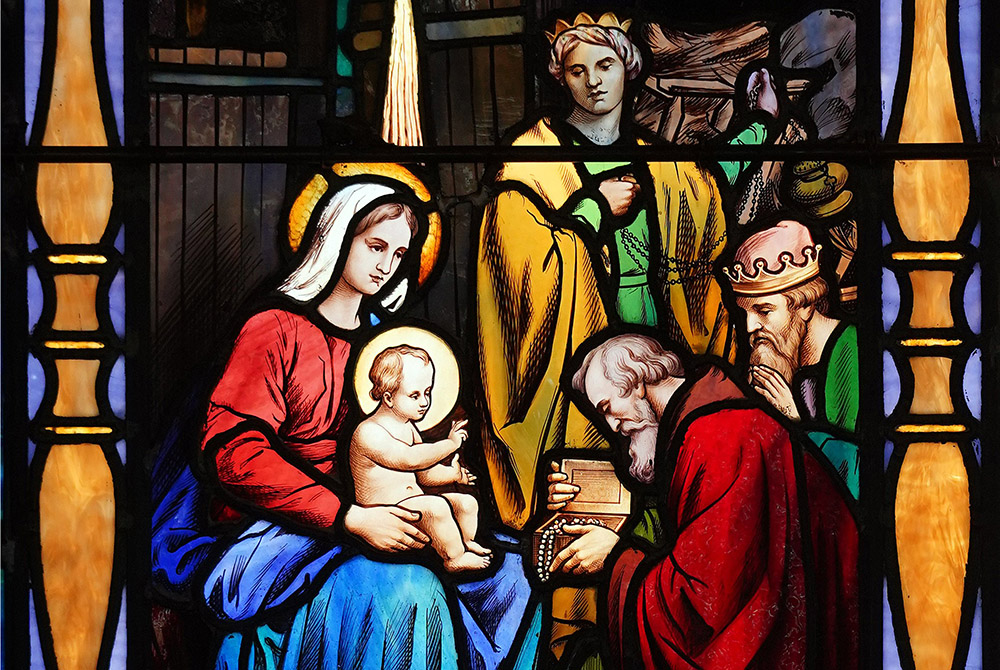
The Adoration of the Magi is depicted in a stained-glass window at St. Mary of the Isle Church in Long Beach, New York. (CNS/Gregory A. Shemitz)
Who were those wanderers who, unimpressed by King Herod, did homage to a newborn babe and allowed an angel to change their travel plans? Our creche sets, carols and myths tell us they numbered three — an idea deduced from the gifts Matthew mentions — but there's no reason to think that there were not more of them: more people and more gifts. By tradition, they are called kings. If so, probably no more than ourselves who are baptized as priests, prophets and kings. (Not many areas of the world had three monarchs anxious to travel together to discover and revere yet another king.) Better we call them the Magi, a title that hints at mystery, magic and miracles.
Historians say it's unlikely that their story reflects any verifiable event. For us, more important than historical fact is the reason Matthew made this part of his Gospel. In that realm, he left us lots of hints. First of all, Matthew borrowed key details for his story from Isaiah's prophecies. Isaiah assures the people who have been in darkness that the light of God's glory will shine on them and that their faith will attract people from afar who will come bearing gifts. With that, we have the background for the star, the travelers, the camels and the gifts: all signs of the advent of God's salvation.
Matthew is commenting on Isaiah and portraying Jesus as the fulfillment of ancient hopes. Continuing his commentary, Matthew describes how the Magi questioned King Herod about prophecies that referred to a king to come. Herod called in theologians who, foreshadowing future officials' attitudes about Jesus, quoted prophecies but exhibited no curiosity to see how they might be fulfilled in their own lifetimes. Matthew thus begins his Gospel with Jesus, Emmanuel, endangered among his own people and revered by representatives of the Gentile world. Matthew's Gospel ends with Christ's command to make disciples of all the nations and the promise that as our Emmanuel, he will remain with us until the end.
What does this narrative mean for us today as we begin the year 2022? Perhaps in these uncertain times (will COVID-19 ever end?), the Magi, those people willing to walk together like participants in a synod, can be our guides. More than the time and money required for their journey, they possessed a key combination of self-confidence and desire for more meaning in life. These attitudes urged them to read the signs of the times and to venture into the unknown. They humbly believed there was more wisdom in the world than they had yet discovered. These travelers, unafraid to seek knowledge from afar, were moved — literally — by a holy disquiet, the restlessness St. Augustine says niggles at us until we rest in God. Thus, they set off in a caravan that became the first Christian pilgrimage.
Today, we see signs of a similar holy disquiet. As a result of COVID-19, people are reevaluating their lives. Researchers have reported that between January and October 2021, one in four people in the U.S. quit their jobs. Additionally, COVID-19 has made it impossible to ignore both the continuing political divisions among us and the wealth and wellness gaps that isolate us from one another, leaving multitudes of our brothers and sisters unconscionably vulnerable. At the same time, while some of our sick and their families suffered an isolation that magnified and even overshadowed the physical effects of illness, others discovered Zoom and other ways to be in direct, visual contact with their loved ones hundreds or even thousands of miles away.
Advertisement
In his book, Let Us Dream: The Path to a Better Future, Pope Francis shares ideas highly applicable to today's feast. He describes our time as a change of epoch, not simply a time of change. He says that this change, "accelerated by the coronavirus, is a propitious moment for reading the signs of the times." Avoiding the trap of easy answers, Francis says, "A gap has opened up between the realities and challenges we face and the recipes and solutions available to us. That gap becomes a space in which to reflect, question, and dialogue."
Let us look to the Magi as models. Inspired by the gap between their knowledge and their hopes, they set out to seek meaning that their lives had not yet given them. They reflected together on the signs of their times and sought wisdom from foreigners, confident that truth from another quarter would only add to the truth they already understood.
As a synodal people, let us be on the move, discerning the signs of our times while refusing to be awestruck by self-important leaders. Let us share the Magi's humble curiosity. Let us appropriate a share of their courage and confidence to that we too can seek, find and follow Christ in our world.








